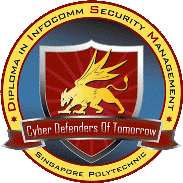Do you have a burning question about
Diploma in Infocomm Security Management (DISM) S54, poly education, further education or career choices open to you after O levels? Visit our JAE Centre (SP Convention Centre) and talk to our friendly lecturers and student counsellors who will be most delighted to advise you.
What are the questions you should be asking:
- Cut-off point of the course (NS: Low COP means better students in the cohort)
- Qualification and experience of lecturers (NS: IT security-related certifications that they hold)
- Advanced standing with universities (NS: Not school level but course level)
- Cohort success rate (NS: Complete the course within the stipulated 3 year duration).
- Progression rate to universities (NS: How many students go to universities)
- IT security-related professional certifications for students (NS: Should be IT security-related and not other general networking certifications)
- Scholarships available to course students (NS: Not school level but course level)
- Scholars in the course (NS: Not poly/school level but course level), such as the Integrated Infocomm Scholarships and National Infocomm Scholarships.
Giving you one example, in year 2010, SP was awarded 16 Integrated Infocomm Scholarships representing 50% of total number of scholarships awarded by iDA to all 5 polytechnics' students. Among the 16 scholarships, 6 of the recipients were DISM students. This number is at course level and not school/poly level.
If you are a high-achiever, consider a course with a lower cut-off point. In year 2010, DISM has a cut-off point of
15. With a lower cut-off point, the learning experience will be more stimulating and exciting because you know the the course will offer you the best potential, scope and knowledge. It also stretches you and your talent which eventually will offer you many open doors to move on to the next milestone.
So don't hesitate, choose
Diploma in Infocomm Security Management (DISM) S54 as your FIRST CHOICE now.
If you have further questions, you can talk to our friendly lecturers and student counsellors during the Joint Admissions Exercise (JAE) at SP Convention Centre (SPCC).





















